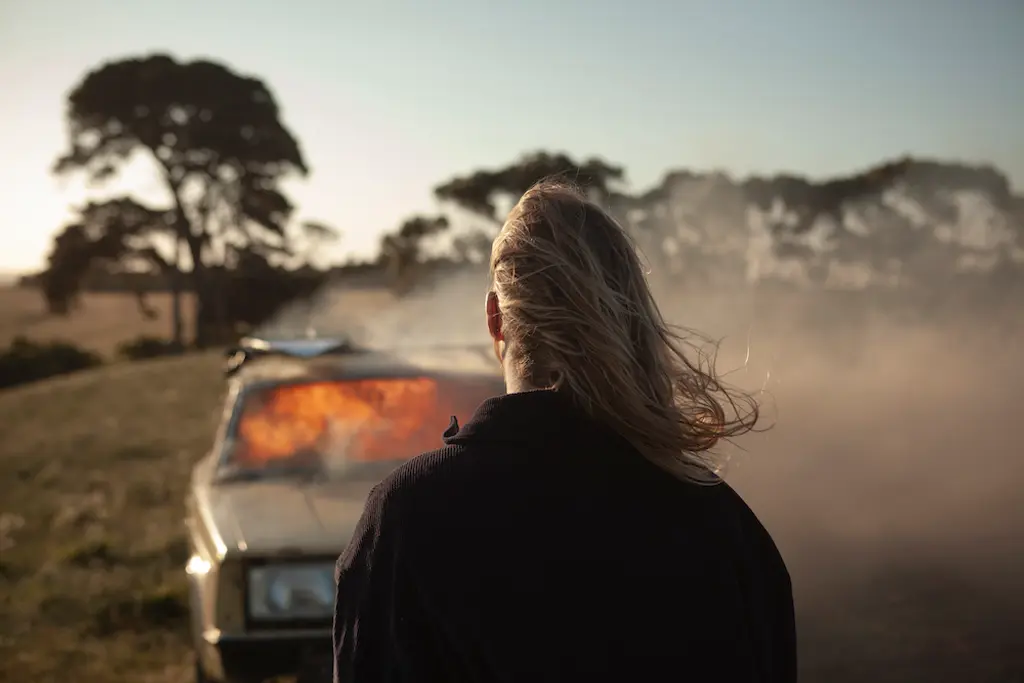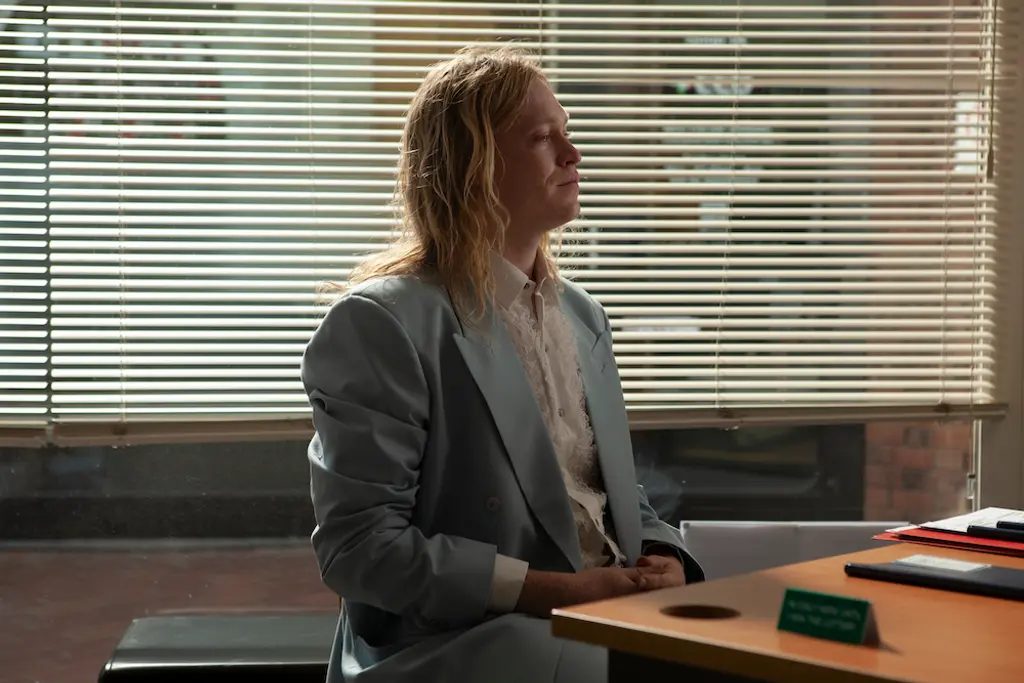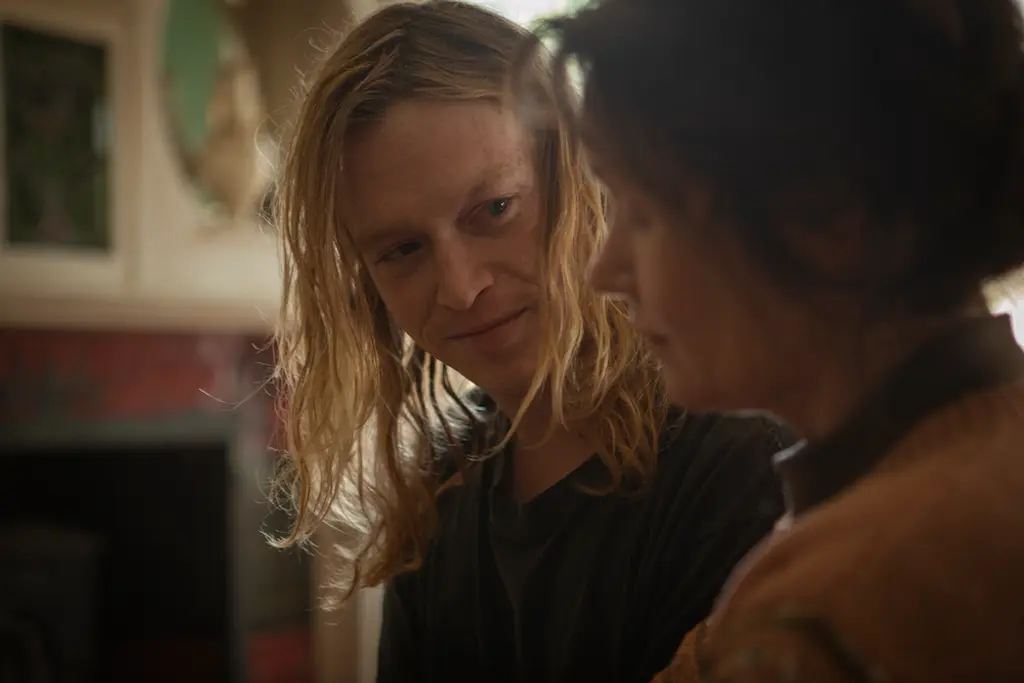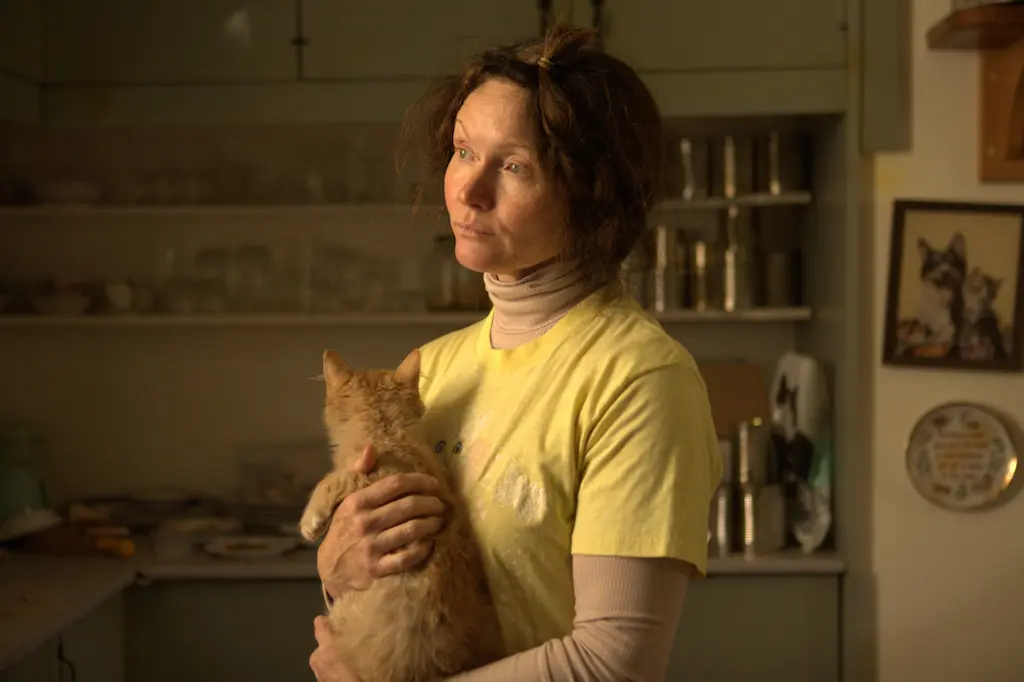This is the year’s most dreadful film

Caleb Landry Jones scooped the top acting prize at Cannes for his chilling portrayal of a real-life Australian killer in Justin Kurzel’s film, Nitram. But would the Texan actor really rather be making wiggy psych albums and watching vintage British sitcoms?
Culture
Words: Craig McLean
Nitram might be the most dreadful film you see this year. As in: full of dread.
Directed by Australian filmmaker Justin Kurzel (Assassin’s Creed, True History of the Kelly Gang), it’s the story of the perpetrator of the April 1996 Port Arthur massacre in Tasmania. Thirty-five people were killed and 23 people injured by a 28-year-old mass shooter.
Playing the title character – a name based on the filmmakers’ imagined school nickname of the “backwards” killer, deployed to avoid giving currency to his real name – is Caleb Landry Jones (Get Out, Three Billboards Outside Ebbing, Missouri). The American actor is terrific and terrifying in the role of the local loner, a man later found by one forensic psychiatrist to have the IQ of an 11-year-old.
After Nitram premiered at the 2021 Cannes Film Festival, Jones won the award for Best Actor. In his portrayal – sympathetic in the early going, nuanced throughout, ultimately horrifying – you can see why.
Nitram lives at home with his parents. They’re beaten down by life, and broken down by dealing with a shiftless, aimless, friendless son who sets off fireworks in the back garden, to the perpetual fury of their neighbours, or sells them to children through the fence of their school.
While attempting to mow lawns to make money, he meets a lonely, wealthy, middle-aged woman living in a dilapidated mansion with a menagerie of cats and dogs. The intellectually disabled twentysomething and fiftysomething heiress embark on a curious friendship.
But Nitram’s anti-social activity shades into incipient pathological behaviour as his peers shun and ridicule him. An obsession with an air rifle is a chilling foreshadowing of what’s to come. The only way is down, and dark, although it’s testament to the filmmakers’ vision and ambition that Nitram is in no way true-crime porn.
Kurzel’s leading man is at his rented home in Los Angeles when we Zoom on a late morning in early summer. Jones is sitting in an upright chair in the corner of a sketchy-looking room, hair cut shorter than Nitram’s lank locks, body leaner than Nitram’s doughy physique, holey T‑shirt on a par with Nitram’s dilapidated clothes.
The Texas-born actor, who lives here with his girlfriend, the artist Katya Zvereva, appears to be smoking a joint, and will wander round the room to prepare another midway through our conversation. His cheerful demeanour and giggling throughout our interview would suggest he’s already rolled his own breakfast.
Before we get into Nitram, we talk about music – his and others’. THE FACE interviewed him in 2020 about his debut album The Mother Stone. Last year he released the follow-up, Gadzooks Vol. 1, a psych-pop curio that’s more Syd Barrett than Sgt. Pepper and which ends with a 20-minute wig-out called This Won’t Come Back.
“That was a let’s‑see-what-happens thing,” he explains in his still-strong Texan twang and ever-present hazy manner. “It started off with five minutes of a lot of information. Then, let’s lose our pants and our shoes… So we just kept playing the keyboard for 20 minutes. Then put on another keyboard. Then put on another keyboard!” Jones says, laughing. “I tried not to edit too much.”
There’s an already-recorded Vol. 2 to come, probably towards the end of this year, promising, it seems, more of the same. In his teens, though, he was mostly raised on a diet of Christian rock.
“But [at the time] they just came out with those MP3s – you know, those little guys that could hold 60 songs? So I traded one of those for six secular albums,” he says of a collection that included LA Woman album by The Doors, The Dark Side of the Moon by Pink Floyd and Van Halen’s Van Halen. “They were the only secular albums that I had. Those were my prize possessions at 15.”


His other cultural love, though, was – and remains – considerably less rock-classic or avant garde. Jones is a huge fan of British comedy. Proper, mainstream telly comedy. He loves Only Fools and Horses, a fandom catalysed by his childhood love of David Jason in Open All Hours.
“I love that guy!” he hoots. “And there’s that guy in the bar from The Vicar of Dibley… I can’t remember the actor’s name but he passed away recently.” I tell him the name of Roger Lloyd-Pack, who died in 2014. Jones cracks up at his memory. “Yeah! He always finds a real odd way to say his line that I could never do. It’s hard to wait around for one line and then come in and say it, then shut up for the rest. He does it brilliantly.”
Those vintage BBC sitcoms came into his life in suburban Dallas via Sunday nights on American channel PBS (Public Broadcasting Service). He reels off the other shows that tickled him: “Monty Python, Fawlty Towers, Keeping Up Appearances, Last of the Summer Wine, Father Ted, Blackadder, Fry and Laurie, Mr Bean. I loved Mr. Bean but I wasn’t allowed to watch the other stuff. There was too much innuendo. Fawlty Towers was OK because she loved John Cleese so much,” he says, presumably referring to his mum, “and [the character of] Manuel.”
“Then I got into things like Derek and Clive. I’ve always liked that [comedy] stuff from over there. Even the really terrible sitcoms from the ’70s, ’80s and ’90s – Are You Being Served?, things like that.”
Given these tastes, I wonder why he hasn’t done more – or any – comedy acting in a film career which began, brilliantly, in the Coen brothers’ No Country for Old Men (2007). Sixteen-year-old Jones cycled up to Javier Bardem’s mop-topped hitman and alerted him to the fact that, “Mister, you got a bone stickin’ out o’ your arm.”
“I don’t know!” Jones replies cloudily, exhaling weed smoke. “I came to LA, I thought that’s all I would probably be doing. But I was always [cast as] the guy that killed animals or his pet when he was a kid. Killed his mother. Wants to fuck his sister. It was always something!” he laughs again, tickled, of an acting resumé that, in his telling, led inevitably to the lacrosse stick-wielding racist brother in Jordan Peele’s Get Out (2017).
“Right off the bat, it was always a little more… [giggle]… over there. I don’t know why.”


Given that history of, well, typecasting, did you think hard about taking on this role in Nitram?
Not after I met Justin and [screenwriter] Shaun [Grant]. After that it was more: how the heck is this going to work out? I didn’t know how but I was going to need to do it if they were serious about wanting me to play the part.
Why did you want to play him?
Oh, because of Justin and Shaun. The script alone said very much what the film was going to be, and what my job in it would be. Then, actually meeting both of them, and realising that Justin wanted something from me that I was, as an actor, excited to give. Because I knew that if it did work, it could be very powerful. If we pulled it off, we’d really have something strong and important – and something that I think is needed.
Important in the sense that we see how this person becomes a mass shooter? And needed because it shines a spotlight on the signs that an individual could be heading towards this terrible ending?
Uh, I don’t know about shining a spotlight. I think the film very meticulously brings you through different relationships, and brings you into the world of a man who’s completely isolated, other than the two components within his family, his mother and father. The world on television is different than the world he experiences. There’s no real space for him to exist in, other than where he is now, [in] which he keeps finding less of a reason to try.
Certainly early on, your portrayal of him plays with the audience’s emotions. Nitram is isolated, bullied, ignored, abused, mocked. Even if, going into the movie, most viewers know how the story ends and what he ends up doing…
[Interjecting] Yeah, but some don’t. I didn’t know anything about it prior to reading the script. And while I was in France [presumably for Cannes], there were some people that I was working with that saw the film, one person in particular didn’t know about the massacre at all… That’s the power of the construction of the film. Not to necessarily normalise it for the sake of this [story] by any means, but to try and explore these spaces, these relationships, and what some of these relationships offer and what some of them take. Nobody has a family that’s not full of holes.
For sure. But it’s still remarkable how you make him a three-dimensional character from the off. He’s not “just” a psychopath. He has issues, clearly, but the building up to the point where he does this terrible thing is very credibly done. What kind of research did you do?
Of course, looking at the interrogations [of the killer], and the reports, and the transcripts, and things like this. And of course looking into the [psychology]: why doesn’t that person want to get close to me? Why are these people living this life? How can I get this effect from people? What was it that was keeping people away? It was about finding these things, and this told me I was getting closer and closer to what we really needed.

George Mackay, who starred in Justin’s last film, True History of the Kelly Gang, told me that the director sent him pictures: of a rock climber hanging by his fingertips off a cliff face, every muscle in his back popping; of limestone quarry-workers with hugely overdeveloped neck muscles from carrying buckets rocks; of mixed martial artist and boxer Conor McGregor. And to an extreme dietician. All these things to help George build the character, physically, from the inwards, outwards. Did you receive similar direction?
That’s not daunting for a young actor! I think Justin’s pretty brilliant at peppering you with things that scare the shit out of you, things that you like, that excite you… that you don’t get! He does a good mindfuck on the actor. And it’s about whether or not the actor wants to let that happen or find another way! ’Cause it’s some kind of strange alchemy that he puts together that is very independent to the character or the film.
Is it true that you ignored Justin’s edict and went fat rather than thin?
I think I just do that in general most of the time. But, yeah, he said: “Get skeletal!” And I just started shoving more meat pies in my face, and went the other way around.
Why did you do that? Why did you think the characterisation needed that?
Oh, probably ’cause I’m lazy. I think also I’m kinda tired of this idea of what thin represents. “He’s sick! He’s wasted away!” We see it too much, no? And [in Nitram] I’m this kind of man-child, in my underwear, eating my Fruit Loops, hearing about the [Dunblane] massacre over in Scotland. And my belly’s [hanging]. That was right to what we were doing, I think, you know? But it’s probably just laziness. And the meat pies were so tasty.
You also have The Forgiven, a Moroccan-set thriller with Ralph Fiennes, Jessica Chastain and Matt Smith, coming out this summer. What’s your character in that?
I’m all about the party and excess, that’s all I remember.
You’re signed on, alongside Viggo Mortensen, for Alex Gibney’s Two Wolves, about the My Lai massacre of civilians by American troops during the Vietnam War. When is that filming?
I don’t know. I literally only know when all of a sudden I’m there, and they say “action!”, and then I know: alright, we’re making this movie. And hopefully I’m not fired a week later.
But you are working soon with Austrian filmmaker Peter Brunner, with whom you made To the Night (2018). What’s your preparation for that next film and what’s it about?
Peter asks a lot. So there are some albums to wrap up, some social work to get started on. And a Bible that I need to read. It’s a father and son [story]. The son has lost the father to homelessness, and can’t get him to stay with him. So he does work within the church in the same city in Texas, and is using advocacy for the homelessness as a means to keep searching for his father.
Long story short, he’s taken away and given an opportunity at a church, where he also discovers a homeless encampment outside of the town. And as the weather gets worse and worse, there’s no choice except to bring people into the church. Which causes all kinds of problems for the town, naturally!
So you’re going back to your home state to shoot that…
I’m very excited to make this film. It’ll be quite different from what we are used to getting: a whitewash of what poverty is. But in America it’s becoming the normality.
And then, finally, that comedy role, yeah?
Yeah, yeah. I’m hoping. Maybe Justin will give me a call and we’ll do a Porky’s movie!
Nitram is in cinemas from 1st July





